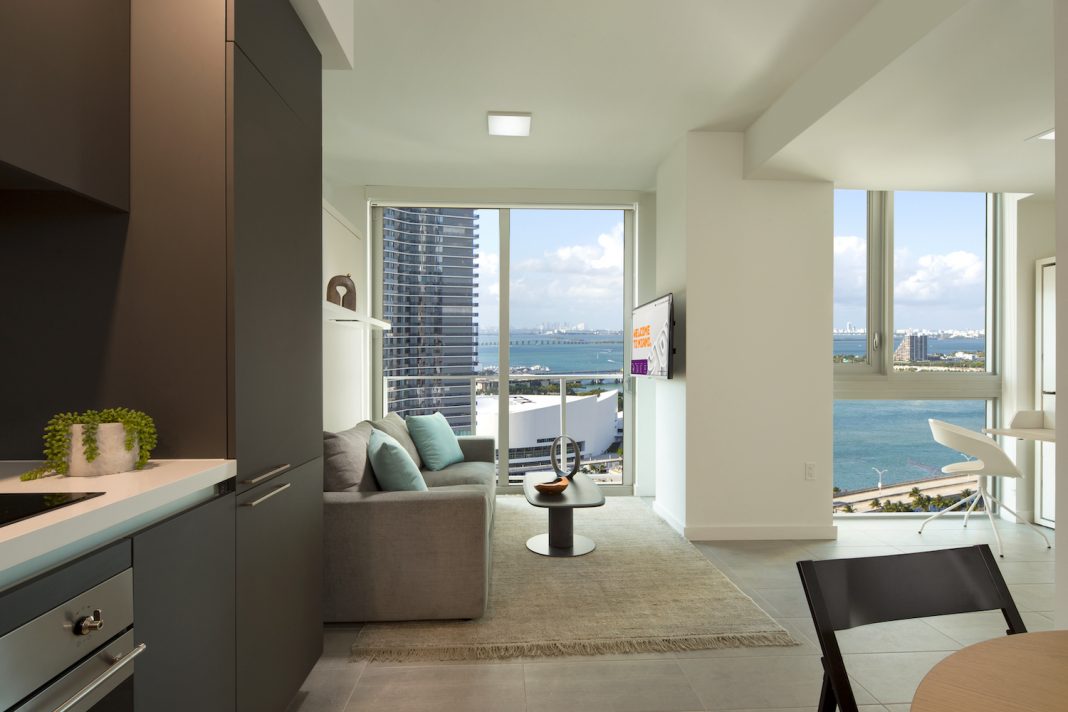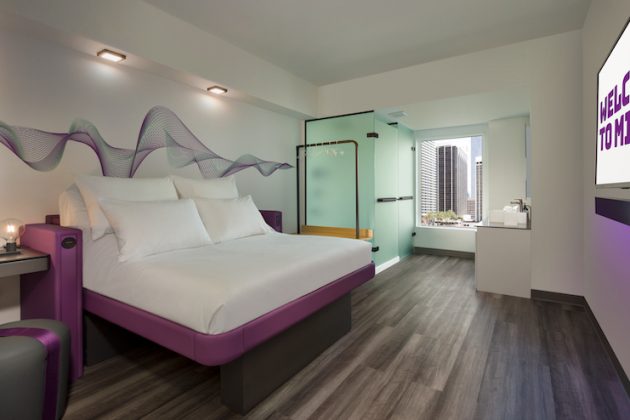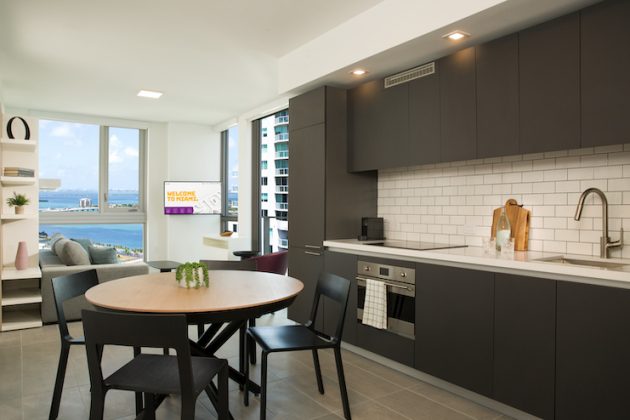In Miami’s fast-growing downtown sits the first dual-branded YOTEL / YOTELPAD Miami. With 222 guestrooms, YOTEL Miami welcomes guests for short, transient stays while YOTELPAD Miami has 231 condominium-style spaces (i.e., “pads”) for long-term guests and residents. As the brand’s first combined concept, the properties are connected through shared communal spaces and food and beverage outlets. LODGING recently visited the properties and discussed with executives where the YOTEL brand is headed next.
“This is a new market for us, a very large property—including the pads, nearly 500 keys,” said Hubert Viriot, CEO of YOTEL. “It’s quite a complex project with two components: a residential extended-stay component and a hotel component. Putting it all together over the last 60 days has been great, and now truly launching has exceeded our expectations.”
Inside YOTEL / YOTELPAD Miami
Chief Financial Officer Rohan Thakkar said the dual-branded concept is “a great model for developers because, in a model like this, they’re able to sell residential… We have a baseline of business by having a hotel downstairs. It’s definitely a model that we think makes a lot of sense because there’s plenty of product out there that does dual-branded but nothing in our segment.”
Viriot also noted, “There’s a way to apply the same ethos we’re doing to hospitality to the extended-stay segment. Our focus is on offering essential luxuries, so we make the pads a little bit smaller, and a little more compact, but design them well with some great furniture. They’re very smartly designed so you can have high occupancy.”
In addition to essential luxuries in the pads, the dual-branded concept in Miami includes shared amenities such as a gym, community space, and dining outlets: Mazeh, a Middle Eastern-inspired restaurant; Float, a pool deck location for light bites and cocktails; and a grab-and-go marketplace-style outlet. Thakkar added, “Part of our DNA is really about smart design, but also localizing our public spaces for whichever market we’re in. The way we do that is by bringing in local interior designers and multiple market research.”
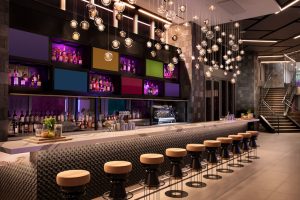
In the Miami market, General Manager of the YOTEL / YOTELPAD Miami Gilberto Garcia-Tunon said the property has been seeing positive trends coming out of the COVID-19 pandemic, including more group business due to its location. He explained, “Because we’re in such a central location, it’s been a very good start. We’re looking forward to the last quarter of the year and beginning our next steps. Based on what we have on the books, we’re extremely satisfied.”
The dual-branded concept capitalizes on these positive trends, Garcia-Tunon added: YOTEL and YOTELPAD attract different demographics but are linked in that travelers want an experiential, tech-focused stay. In response to the market disruption caused by alternative accommodations and short-term rentals, he said YOTEL is taking an approach that mirrors the adage, “If you can’t beat ‘em, join ‘em.” The dual-branded concept “gives us the opportunity to basically compete against and play in the same field as disruptors. But at the same time, we’re one-upping them with the services we offer in the pads; we’re creating that longer stay but we’re offering better service. We’re providing a much more elevated service experience.” Garcia-Tunon added that YOTEL’s tech-focused nature allows the hotels to weather ongoing industry-wide staffing shortages and provide the elevated service he described. For instance, the Miami properties have two robots that deliver ordered amenities to guestrooms, and kiosks allow guests to check in and check out without employee assistance. These solutions enable guests to enjoy a touchpoint experience with team members, Garcia-Tunon said: Technology “alleviates a lot of the transaction duties that someone would have when they’re checking a guest in.”
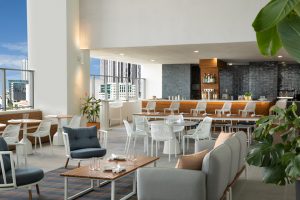
This shift in operations impacts the hotel’s recruitment process, Garcia-Tunon explained, putting greater emphasis on “big personality.” He added that for his property, he’s looking for employees that “are investing in their career, their growth, their opportunity; and through YOTEL—the company, the brand—we’re able to provide that as an added benefit.”
Franchisee Focus and Future Growth
In addition to the Miami property, more YOTEL / YOTELPAD dual-branded concepts are coming, the next located in Dubai. While YOTEL’s overall focus is on global urban markets, the brand is open to new opportunities. At the beginning of 2022, YOTEL launched its franchising business. Viriot explained, “It opened some new opportunities because we can now work with great operators around the world who can successfully operate in markets where we didn’t necessarily think it would be obvious for us. Certainly, more second-tier cities became an opportunity for us, or even completely new countries where we wouldn’t have thought to go at this stage of our growth. And lastly, but probably most importantly, our target audience is growing exponentially.”
The franchise model is still North American-based, but Viriot mentioned that it’s becoming more international. Despite the limitations, it gives YOTEL more opportunities to work with groups that only take part in franchise models and not management contracts. He said, “We’ve got four franchisees, which is still very little. It’s in its infancy, but it’s very interesting and a great learning curve for us. We’ve learned not to be the operator but to be the franchisor, focusing on the commercial element, the distribution, the direct bookings, so we’ve built up our commercial team significantly since then.”
The franchise model isn’t the only new update to YOTEL. Viriot shared that the company is working on expanding YOTELAIR, but there are inherent barriers that come with growing the concept, including commercial saturation in airports lacking space and many airports currently updating facilities. Thakkar also shared, “In the last three months, I think we’ve made the most progress we’ve ever made. I’m more positive about YOTELAIR than I’ve ever been.”
YOTEL has also recently updated its branding, starting with developing the target market of “Generation Go,” with the tagline of “Non-stop.” Vice President of Brand & Communications Olivia Donnan shared that fonts have also been updated to modernize the brand, and imagery is being presented in a more authentic manner. This, however, is not a total rebrand for the company; it’s an update to help YOTEL grow and remain relevant in the current and changing traveler landscape. “We’re not coming in and changing the brand. That remains the same. Our ‘why’ is to challenge the status quo, and our values are being really authentic. We actually want our photography to look like our photography, to look like our hotels. We want our service to be authentic. We want to be really honest about who we are and exist in our space and not always try to be something different. And it comes right down to the consistency of the product. You obviously have older hotels and newer hotels, but if you have a different owner versus a franchisee, they shouldn’t be so wildly different. There’s an authenticity to the hotel.”
The company’s executives said YOTEL will continue to balance challenging the status quo of the hospitality industry while not being disruptive. And, there’s much more to come from the brand.

